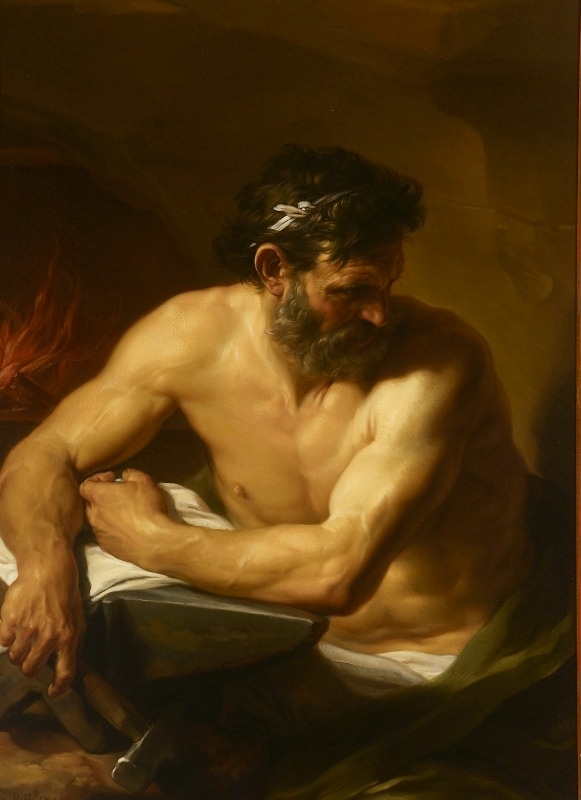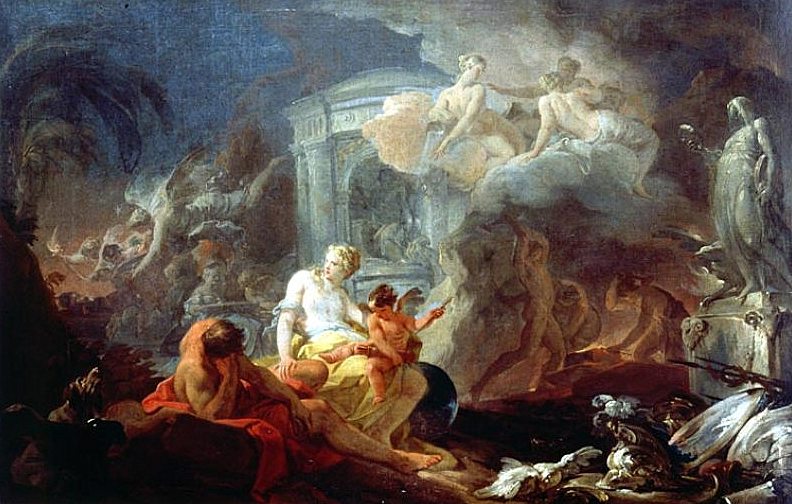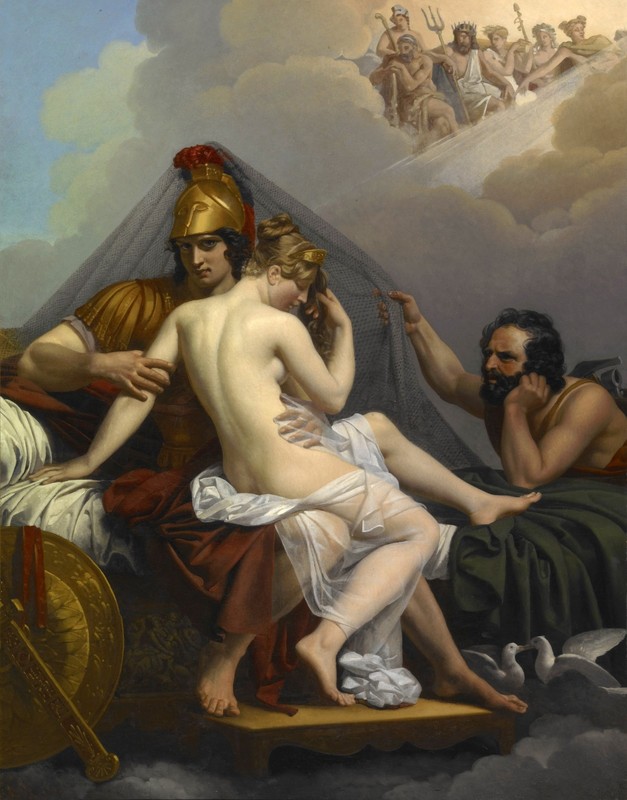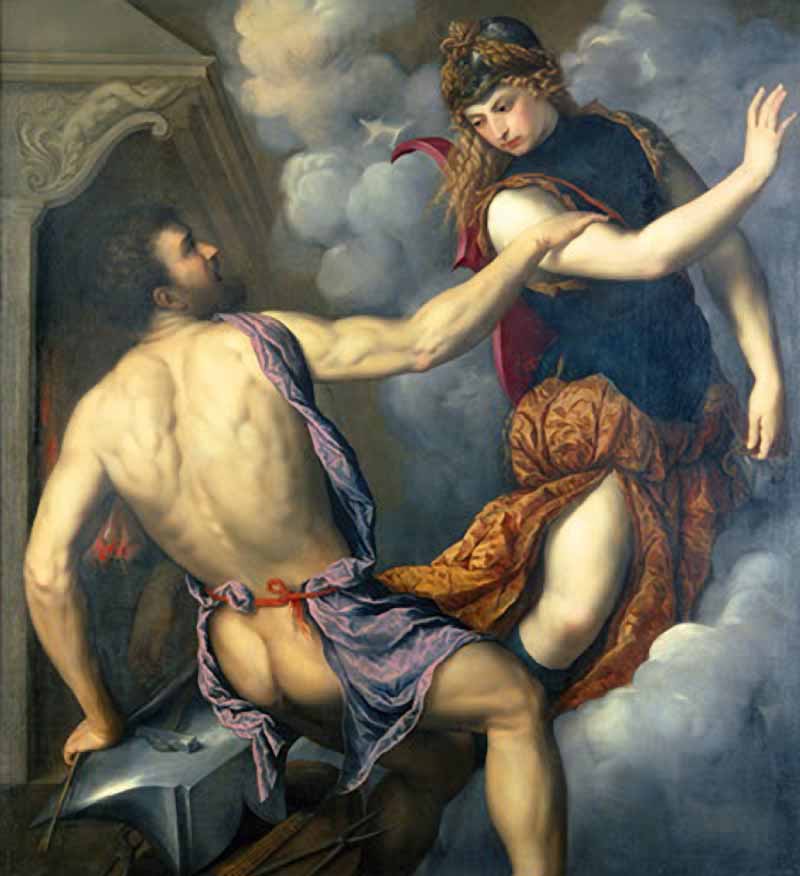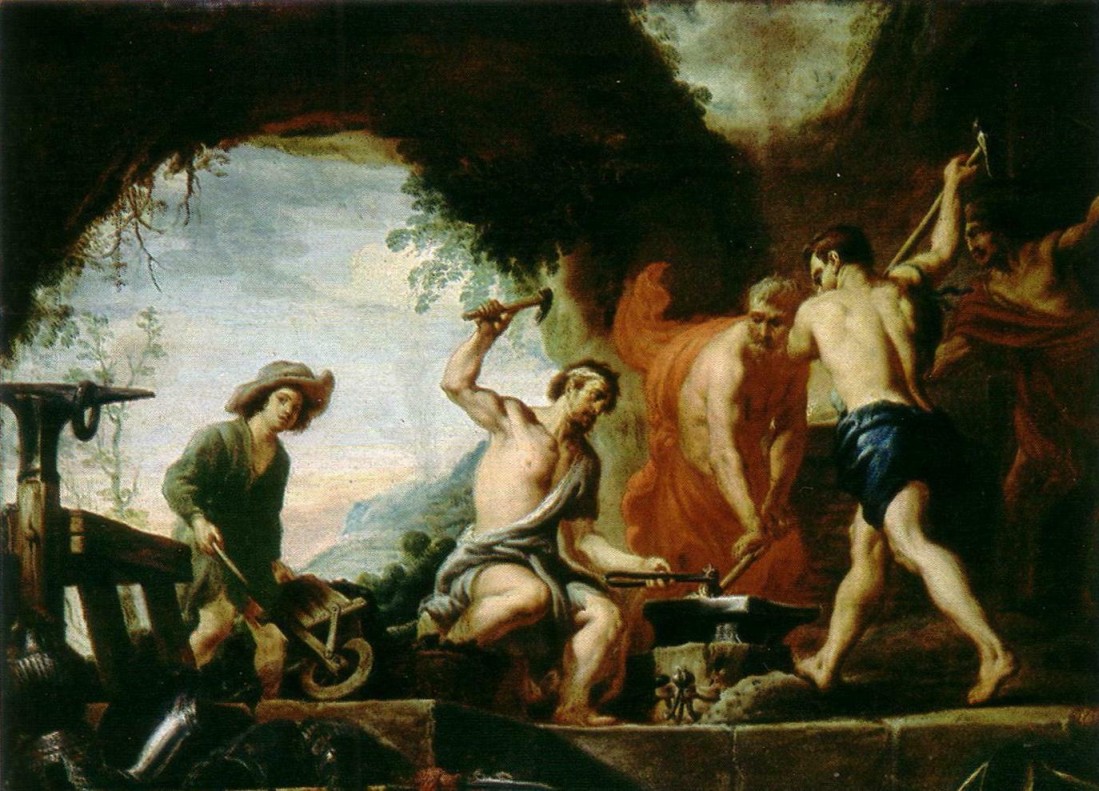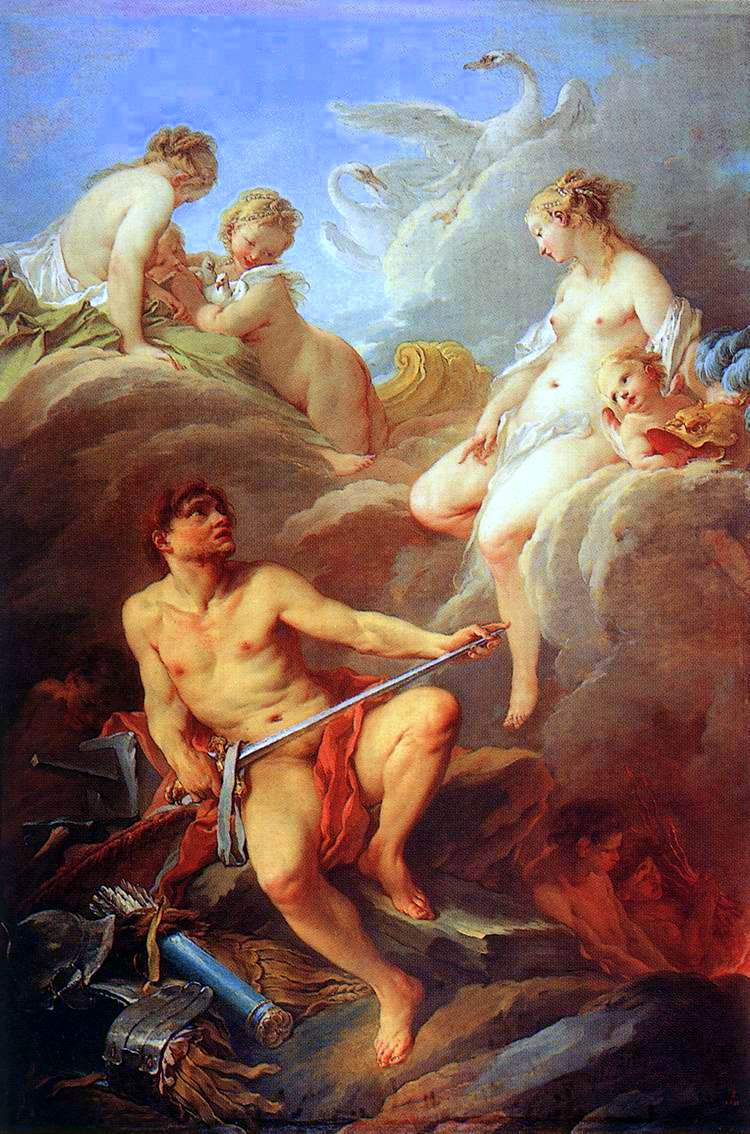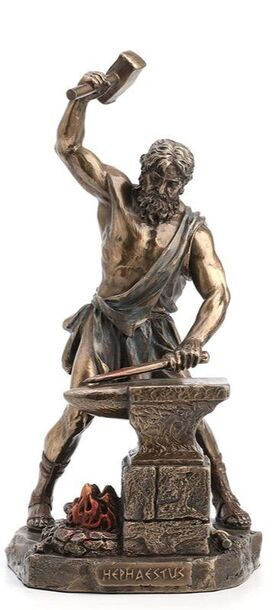HEPHAESTUS IN GREEK MYTHOLOGY
Hephaestus was the Greek god of metalworking and fire, and was therefore an important deity, so important indeed, that Hephaestus was considered to be one of the 12 deities of Mount Olympus.
Hephaestus Son of Hera
|
The most famous story of the birth of Hephaestus appears in the Theogony (Hesiod), for the Greek writer tells of Hephaestus being born to the goddess Hera alone, without the need for a father.
This bringing forth of life by Hera, was probably a form of retribution against Zeus; Zeus had effectively “given birth” to Athena without Hera being involved. This divine birth though, may have caused issues, for whilst the gods and goddesses of the Greek pantheon were known for the beauty, Hephaestus was born ugly, and perhaps with a limp. The deformities of Hephaestus were sufficient for Hera to immediately reject the baby, and so the Greek goddess was said to have thrown her child off of Mount Olympus, and after a long fall, Hephaestus fell into the sea near to the island of Lemnos. |
Hephaestus was rescued from drowning by the Oceanid Eurynome and the Nereid Thetis, and was taken to the island of Lemnos, but grew up not knowing where he came from.
Hephaestus Son of Hera and Zeus
Despite being the more famous story, it was actually more common in antiquity to name Hephaestus as the son of Zeus and Hera, born from the union of god and goddess.
Hephaestus Thrown from Mount Olympus
|
If it was the case that Hephaestus was the son of Zeus and Hera, then it was when Hephaestus was older that he was thrown out of Mount Olympus; with the eviction being undertaken by Zeus.
The reason why Hephaestus is thrown out of Mount Olympus was due to his attempt to protect Hera from Zeus, either because of unwanted advances from her husband, or to protect his mother from the anger of Zeus. |
|
Possibly, Hephaestus had cut Hera out of the golden chains that Zeus had bound her in, holding her between heaven and earth. One reason given for the confinement of Hera was perhaps because she had had Hypnos put Zeus into a deep sleep so she could enact some revenge upon Heracles.
For his intervention, Hephaestus was thrown, by Zeus, off of Mount Olympus; and fell to earth, following a fall lasting one day, onto the island of Lemnos. The fall from Mount Olympus would not kill the god, but the landing did perhaps cripple him, causing the lameness with which Hephaestus was often depicted.
Some ancient sources suggest that Hephaestus was actually thrown out of Mount Olympus on more than one occasion.
For his intervention, Hephaestus was thrown, by Zeus, off of Mount Olympus; and fell to earth, following a fall lasting one day, onto the island of Lemnos. The fall from Mount Olympus would not kill the god, but the landing did perhaps cripple him, causing the lameness with which Hephaestus was often depicted.
Some ancient sources suggest that Hephaestus was actually thrown out of Mount Olympus on more than one occasion.
Hephaestus on Lemnos
On the island of Lemnos, Hephaestus was cared for by the local Sintian tribe. Hephaestus learned how to be a great craftsman and setting up his first forge upon the island, soon he was making beautiful jewellery, including pieces crafted for Thetis and Eurynome.
The Revenge of Hephaestus
At the same time, Hephaestus was also plotting. Some tell of how Hephaestus was seeking information about his parents, whilst others tell of him seeking revenge upon Hera for either rejecting him, or else not protecting him from Zeus, but in any case Hephaestus crafted an elaborate golden throne, which he had transported as gift to Mount Olympus.
As soon as Hera sat upon the throne, the chair engulfed her, and the goddess was unable to rise up from her seat. Now at any other time, the entrapment of Hera would have brought no great reaction from the other gods, but the powers of the goddess were in demand, and so Hephaestus was asked to come to Mount Olympus to release his mother.
Hephaestus though, refused to leave Lemnos, and would not tell of how Hera could be released.
Eventually it was left to Dionysus to bring Hephaestus to Mount Olympus, something the Greek god of the vine did, not by force, but making Hephaestus intoxicated and then lugging him to the home of the gods upon the back of a mule.
As soon as Hera sat upon the throne, the chair engulfed her, and the goddess was unable to rise up from her seat. Now at any other time, the entrapment of Hera would have brought no great reaction from the other gods, but the powers of the goddess were in demand, and so Hephaestus was asked to come to Mount Olympus to release his mother.
Hephaestus though, refused to leave Lemnos, and would not tell of how Hera could be released.
Eventually it was left to Dionysus to bring Hephaestus to Mount Olympus, something the Greek god of the vine did, not by force, but making Hephaestus intoxicated and then lugging him to the home of the gods upon the back of a mule.
Hephaestus and Aphrodite
When sobered up, Hephaestus did agree to actually release Hera, possibly because Zeus bribed him with the promise of a prominent role upon Mount Olympus, and also the promise that Aphrodite, the Greek goddess of Beauty and Love, would be his wife.
The promise of Aphrodite was enticing for Hephaestus, after all she was arguably the most beautiful of goddesses, and a marriage between the pair would suit Zeus, for it should prevent others from chasing the goddess of beauty. Aphrodite though, was not particularly enamoured in being married to the ugly Hephaestus.
The promise of Aphrodite was enticing for Hephaestus, after all she was arguably the most beautiful of goddesses, and a marriage between the pair would suit Zeus, for it should prevent others from chasing the goddess of beauty. Aphrodite though, was not particularly enamoured in being married to the ugly Hephaestus.
Hephaestus Catches the Cheating Lovers
|
Aphrodite would soon be cheating on Hephaestus, and would take up with Ares, the Greek god of war and battle lust. The regular meetings between Ares and the wife of Hephaestus were observed by Helios, the sun god who saw all, and Hephaestus was informed of his wife’s infidelity.
Hephaestus would craft an unbreakable golden net, and the metalworking god would ensnare the naked Ares and Aphrodite mid-lovemaking. Hephaestus then dragged the pair back to Mount Olympus. Hephaestus might have expected some consternation amongst the other gods of Mount Olympus but all they did was laugh at Ares and Aphrodite for having been caught. |
Ares and Aphrodite would be released from the net after Ares agreed to pay a “fine”, but the tryst saw Aphrodite falling pregnant with the goddess Harmonia. Some sources suggest that Aphrodite and Hephaestus were subsequently divorced.
Hephaestus would have some more revenge on his cheating wife, for Hephaestus crafted a cursed necklace, the necklace of Harmonia, which brought tragedy to all those who subsequently possessed the necklace.
Hephaestus would have some more revenge on his cheating wife, for Hephaestus crafted a cursed necklace, the necklace of Harmonia, which brought tragedy to all those who subsequently possessed the necklace.
Lovers and Children of Hephaestus
|
The marriage of Hephaestus and Aphrodite brought forth no children, but Hephaestus was said to have had a number of mortal and immortal lovers, and also a number of children.
It was said that, after Aphrodite, Hephaestus would marry the youngest of the Charites, Aglaia (or Charis). This marriage bore fruit, for Hephaestus would become father to four daughters; Eucleia, goddess of glory, Eupheme, goddess of speaking well, Euthenia, goddess of prosperity, and Philophrosyne, goddess of welcome. |
Hephaestus also had lovers where his forges were located, so on Lemnos, Hephaestus would consort with Cabeiro, a sea-nymph daughter of Proteus. Cabeiro would give birth to two sons, the Cabeiri, who were revered as metalworking gods. This relationship also brought forth the Cabeirides, nymphs of Samothrace.
On Sicily, Hephaestus’ lover was Aetna, another nymph, who gave birth to the Palici, gods of the geysers of Sicily, and perhaps also Thalia, a nymph.
The most famous son of Hephaestus was probably Erichthonius, the man who became king of Athens. Hephaestus sought to have a relationship with the beautiful Athena, but the goddess spurned his advances. When Hephaestus tried to force himself on the goddess, he ejaculated upon the thigh of the goddess, who subsequently brushed the semen away. The semen fell onto Gaia, the earth, who became pregnant, and so was born Erichthonius.
Other mortal sons of Hephaestus also included, King Olenos, Ardalos, the inventor of the flute, Peophetes, the bandit, and Palaemonius, the Argonaut.
On Sicily, Hephaestus’ lover was Aetna, another nymph, who gave birth to the Palici, gods of the geysers of Sicily, and perhaps also Thalia, a nymph.
The most famous son of Hephaestus was probably Erichthonius, the man who became king of Athens. Hephaestus sought to have a relationship with the beautiful Athena, but the goddess spurned his advances. When Hephaestus tried to force himself on the goddess, he ejaculated upon the thigh of the goddess, who subsequently brushed the semen away. The semen fell onto Gaia, the earth, who became pregnant, and so was born Erichthonius.
Other mortal sons of Hephaestus also included, King Olenos, Ardalos, the inventor of the flute, Peophetes, the bandit, and Palaemonius, the Argonaut.
The Works and Workshops of Hephaestus
|
Upon his arrival on Mount Olympus, Hephaestus built himself a secondary forge, after that of Lemnos, and soon other forges were said to have been built beneath each of the ancient world’s known volcanos; for the work of Hephaestus was said to have been the cause of the volcanic acivity and eruptions. Additionally, forges of Hephaestus were thus to be found upon Sicily, Voclanos, Imbros and Hiera.
Famously, Hephaestus would be aided at his forges by the three first generation Cyclops, Arges, Brontes and Steropes. Hephaestus also crafted automatons to help in the workshops, and automatic bellows also operated in his workshops. Automatons were central to the mythological prowess of Hephaestus, enabling movement in non-living creations, and as such, the automatons crafted by Hephaestus included the Bulls of Aeetes, Talos, and his own private handmaidens. Many of the features of Mount Olympus were also crafted by Hephaestus, with thrones, golden tables, the marble and gold palaces of the gods, and also the golden gates at the entrance to Mount Olympus all being built by the metalworking god. Hephaestus crafted the famous chariots of Helios, Ares and Aphrodite, as well as a chariot for his sons, the Cabeiri. Many of the weapons for the gods were also crafted by Hephaestus and the Cyclopes, and bows and arrows for Apollo, Artemis and Eros, as well as the helmet and sandals of Hermes were crafted. |
|
Mortals also benefited from the work of Hephaestus, and Hephaestus also built palaces for various kings, including Aeetes, Alcinous, and Oenopion.
Heracles also received a quiver made by Hephaestus, as well as the bronze clappers used by the heroes to scare away the Stymphalian birds.
Pelops would also benefit from gifts made by Hephaestus, for it was the god who made the shoulder bone, to replace the one accidentally eaten by Demeter. Pelops also received a royal sceptre crafted by the god, a sceptre which eventually be owned by Agamemnon.
Heracles also received a quiver made by Hephaestus, as well as the bronze clappers used by the heroes to scare away the Stymphalian birds.
Pelops would also benefit from gifts made by Hephaestus, for it was the god who made the shoulder bone, to replace the one accidentally eaten by Demeter. Pelops also received a royal sceptre crafted by the god, a sceptre which eventually be owned by Agamemnon.
Hephaestus and Prometheus
Hephaestus is closely linked with the story of the Titan Prometheus for when the Titan stole the secret of fire to give to man, it was from the forge of Hephaestus upon Mount Olympus that it was taken.
Hephaestus was thereafter closely linked to the punishment of man and Prometheus, for Hephaestus was said to have crafted Pandora, the first women, who brought suffering upon man, and it was also Hephaestus who chained Prometheus to the Caucasus Mountains as part of the Titan’s punishment.
Hephaestus was thereafter closely linked to the punishment of man and Prometheus, for Hephaestus was said to have crafted Pandora, the first women, who brought suffering upon man, and it was also Hephaestus who chained Prometheus to the Caucasus Mountains as part of the Titan’s punishment.
Hephaestus and the Trojan War
|
During the Trojan War Hephaestus was considered to be friendly towards the Achaean forces, and his mother Hera certainly was.
Famously, Hephaestus crafted armour and a shield for Achilles, after being asked to by Thetis, the mother of Achilles, and a former rescuer of the god. But at the same time, Hephaestus also crafted armour for the Trojan defender Memnon, after a request from Eos, goddess of the Dawn. After the war, Hephaestus would also craft armour for Aeneas, another Trojan, following a request from Aphrodite. During the Trojan War, the gods also, on occasion, took to the battlefield, and in one of the most famous fights between gods, Hephaestus faced the Potamoi Scamander, after Scamander had come close to killing Achilles. Hephaestus lit a great fire, and this fire caused the waters of Scamander to dry up, forcing the Potamoi into a retreat. |
Again though, Hephaestus also had cause to help the Trojans for the god rescued Idaios, the son of the priest of Hephaestus Dares, when it looked like Diomedes would strike down Idaios, just as he had done with his brother, Phegeus.
Hephaestus in BattleA similar tale to that of Hephaestus and Scamander is also told during the war between Dionysus and the Indians, for Hephaestus battled Hydaspes, another river god.
During the Indian War, Hephaestus would come to the rescue of his sons, the Cebeiri, twice. |
|
Hephaestus was also a prominent fighter during the Gigantomachy, the war of the giants, and it was said that he, as well as Dionysus, first rode onto the battlefield upon the backs of asses, and the braying of the asses initially put the Gigantes to flight. During the war it was also said that Hephaestus killed the giant Mimas by pouring molten iron onto him.
When Typhon attacked Mount Olympus though, Hephaestus did not stand and fight, and like most other Olympian gods turned and fled to Egypt. In Egypt Hephaestus would become known as Ptah.
When Typhon was eventually defeated by Zeus, it was said that Typhon was buried beneath Mount Etna, and Hephaestus thereafter acted as a guard, ensuring the dangerous giant could not escape.
When Typhon attacked Mount Olympus though, Hephaestus did not stand and fight, and like most other Olympian gods turned and fled to Egypt. In Egypt Hephaestus would become known as Ptah.
When Typhon was eventually defeated by Zeus, it was said that Typhon was buried beneath Mount Etna, and Hephaestus thereafter acted as a guard, ensuring the dangerous giant could not escape.
The Favour of Hephaestus |
Amazon Advert |
|
The Olympian gods were known to be quick to anger, but the anger of Hephaestus was normally directed at other gods and goddesses, whilst he was more sympathetic to mortals.
Pelops, the son of Tantalus, with a bone in his shoulder crafted by Hephaestus, came to the god for absolution, having killed the charioteer Myrtilos, in order to win the hand of Hippodamia and the throne of Pisa. Hephaestus was also sympathetic to the plight of the hunter Orion, after Orion had been blinded by King Oenopion. So, Hephaestus loaned Orion one of the god’s helpers, Cedalion, to guide him to Helios, so that the blind Orion might see once again. |
Hephaestus and the Birth of Athena
In the famous telling of the birth of Hephaestus it was said that the metalworking god was born in retribution to the birth of Athena by Zeus.
It was though, also commonly said that Hephaestus had been present at the birth of Athena, with Hephaestus wielding the golden axe which released the fully grown goddess from the head of Zeus. Meaning that Hephaestus predate Athena.
It was though, also commonly said that Hephaestus had been present at the birth of Athena, with Hephaestus wielding the golden axe which released the fully grown goddess from the head of Zeus. Meaning that Hephaestus predate Athena.
Further REading
|
|
